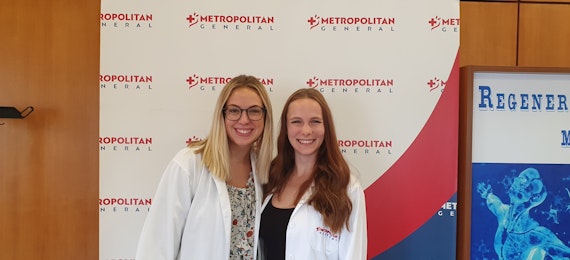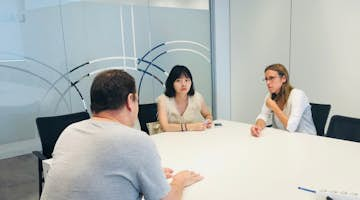
Human Rights & NGO Support Internships in Morocco
Intern with organizations that strive to advance and protect human rights through recognition of equality, freedom of expression, and more. There is scope on this internship for interns to be matched with a range of organizations, such as NGOs, Support Groups and Youth Organizations. Contribute to efforts dedicated to the promotion of acceptance and unity for a range of people. As an intern you’ll support professional advocates in their provision of services such as social assistance, education, vocational training and support and more.
What to expect from your Human Rights & NGO Support internship:
- Gain an understanding of how to support and advocate for vulnerable communities.
- Learn about human rights issues in Morocco and how strategies are put in place to make a difference.
- Develop practical NGO experience for career development.
- Explore all the attractions of Rabat and the beauty of wider Morocco.
Your internship abroad host organization:
- NGOs
- Support groups
- Youth organizations
Internship details
Human Rights & NGO Support internships in Morocco provide eye-opening insight into how organizations work to address complex societal challenges. Interns gain an opportunity to collaborate alongside NGOs, Support Groups and Youth Organizations. With the progression of human rights at the forefront of their mission, organizations work to promote acceptance, unity, and better quality of life, for a diverse range of people in Morocco. As an intern you’ll support professional advocates in their provision of services.
This is an in-country internship which includes accommodation and meals. Click here to view remote Human Rights & NGO Support internships, hosted out of Morocco, which you can undertake from home.
Morocco has a long history of demonstrating unique global leadership - it was the first country in the world to recognize the nation of the United States, in 1777! Although the progression of human’s rights has been challenged by a history of inequality, recent efforts have been made to improve conditions.
Modern amendments to legislation have increased female representation in Morocco, across a range of sectors. Since 2011, the Moroccan constitution also recognized human rights, in agreement with the Universal Human Rights Declaration. This legally provides for their protection and respect. However, despite such political assurances, deeply ingrained challenges to human rights remain.
Many NGOs in Morocco work tirelessly to address and support the marginalized groups of society, who are vulnerable to abuse and exploitation. In addition to addressing human rights issues for Moroccan people, many Human Rights organizations also focus on migrants and asylum seekers, and even the problem of trafficking. Given Morocco’s geographic position - lying directly across from Spain - it is the point where Africa meets Europe. Whether hoping to find better living and working conditions in Morocco, or hoping to transit over to the European continent, the challenges associated with migration and vulnerable people are incredibly complex.
There is a broad portfolio of both grassroots and international organizations for internship placements available within this Human Rights & NGO Support field. Hosted in the capital city of Rabat, you’ll find many organizations involved in a range of issues, related to diverse themes - for example, women’s rights, migrant support, LGBTQIA+, and more. Campaigning for equal rights, freedom of expression, asylum, or many other worthy causes requires persistence over time, fresh energy, new perspectives, and open minds.
Interns contribute their efforts to gain firsthand experience and practical skills, while also lending support and ideas to professionals who have dedicated a career to such missions. Such organizations value the contributions of interns, who can contribute to activities which strengthen the organization’s capacity and scope of work. Interns may assist with workshops provided to migrants and refugees, raise awareness, assist with migrant educational programs, and contribute to grant writing.
French and/or Arabic language proficiency is not a requirement to join this internship. However, interns should expect that a language barrier can still be encountered to various extents. Interns should be prepared for the very natural and normal frustration of not always understanding what is being said around them. Come prepared and willing to surmount a language barrier (and ask for help when needed), as opposed to being intimidated by it. Bear in mind that language lessons can be added to the experience and we encourage participants to consider signing up for these.
In all cases, interns should expect that the first week of your experience will focus on settling in and gaining some introductory knowledge, as you will not “hit the ground running”. Rather, you should start with learning about the placement to gain an understanding of what you can build upon, develop, learn, and contribute. Ensure that you ask questions and provide feedback during the introductory period, so that your supervisor understands how you’re progressing. This will help them to better understand important details, such as how quickly you learn, what you find challenging, what you find interesting, etc.
Understand and expect that individual internship experiences vary, as the specific placement that you’re assigned will depend on review of your resume and your current level of studies and experience. Therefore, if you’re at a more introductory level, you should reasonably expect a more introductory internship. Likewise, if you’re interning for a shorter duration, you will have a different experience from someone who is interning for a longer duration. Placement preferences are considered but always subject to availability.
Typical Schedule
-
Approximately Monday to Friday, 9am - 5pm.
What are the career benefits of interning abroad as a Human Rights & NGO Support Intern?
Human Rights & NGO Support interns learn from a qualified and experienced supervisor, and can be involved in:
-
Contributing to the provision of vocational training.
-
Raising awareness of individual freedoms and ways to improve them.
-
Planning and designing community events, according to organizational priorities.
-
Assisting with the development of fundraising and awareness campaigns.
-
Organizing and/or teaching workshops and English lessons.
-
Assisting with content creation and digital communications for social media platforms and newsletters.
-
Development of outreach strategies for seeking grants, funding, and other support.
Professional development opportunities:
-
Support causes that promote human rights and equality. Produce content both on and offline to raise awareness and support.
-
Learn about the challenges facing disadvantaged communities and individuals in Morocco.
-
Intern alongside experienced human rights advocates and learn from their professional experience and mentorship.
-
Gain insight into the socioeconomic impact of gaining fair representation.
-
Gain practical skills and boost your employability, with guidance from RISEWAY’s Experiential Learning Curriculum to support your learning and cultural intelligence.
Are you eligible for this internship?
Submit a free application so we can confirm your eligibility and check availability for your preferred dates.
Not sure which program to join?
Morocco photo gallery
What recent Human Rights & NGO Support interns said about their experience
I loved my internship and the work I was doing, and I felt like the ground team was super responsive and fantastic in their support. The program manager on the ground was incredible, I couldn't have asked for a more caring and accommodating human, really he is great! I had a good experience, and Morocco was incredible. If you are looking to work abroad, and can't find anything on your own, RISEWAY is a great place to start.
I most enjoyed the cultural immersion of this internship. I feel as though I truly do understand more about the Middle Eastern and North African Region, and greatly benefited from the 'base' of support this program offered.
For a very long time, I had been searching for the right work abroad experience and finally came across this program. Intern HQ Abroad fulfilled all of my expectations. From the very beginning, everything was spectacular. The airport pickup was smooth, the daily breakfasts and dinners were delicious (and very traditional), and Dallas was extremely attentive to all of the intern's requests. I felt completely safe, supported, and comfortable. There were local program supervisors/assistants frequently in communication with the interns and physically present at the riad accommodation to impart important information to us regarding work placements, our whereabouts, etc. The quality of the internship work was good; we were placed with an excellent national organization and given enough time to deliver projects. The NGO team was kind and actively collaborated with us. Commuting in Rabat was easier than I expected: the bus fare is only 5 dirhams, the tram is 6 dirhams, public transit is equipped with air conditioning and free Wifi, there are taxis everywhere, and local drivers are accessible. Aside from the capital (which, by the way, is the most relaxed city in Morocco) there are multiple destinations that can be easily accessed via train. Interns have the chance to plan little weekend trips - we were able to visit the beautiful cities of Fez, Essaouira, Marrakech, Tangier, and Casablanca. Overall the experience was fantastic, it was an opportunity to meet interesting people, make local connections, immerse ourselves in the beauty of Moroccan culture and become familiar with the dynamics of an NGO in the humanitarian sector. This internship felt like a dream.
Considering that I was travelling alone for the first time, it was a huge relief to be received so warmly. I am grateful for the kind interactions I’ve shared with locals, fellow interns and team members. Witnessing and learning about the rich culture of Morocco has also been a joy! I have most enjoyed meeting new people and immersing myself in a new culture. This internship contributed to my professional development by introducing me to my career field of interest. It has allowed me to network, and make connections which I can then turn back to in the future. I have learnt about the status of human rights in Morocco and thus feel inspired to pursue this career path in the future.
After this internship, I feel much more experienced with much of the day-to-day challenges facing smaller NGOs and I have a much clearer picture of the reality actually faced in the field, rather than the more clinical version from my classroom. Everything in Morocco - from traveling to organizing meetings - is much more chaotic than back home and requires much more creativity and initiative, while at the same time offering greater opportunity and freedom. My favorite outcome from the internship would be getting a project approved for funding. It took a lot of work and coordination among the interns and local staff to design the project so it was a great relief and happy moment to hear we had been approved.
To read all reviews, visit our reviews page.

Academic credit available for all internships
Get course credit from your college or university while completing your internship abroad or a remote internship program. It's a great way to meet your academic requirements and gain valuable experience at the same time.
Learn about course creditProgram fees
Applying for our Human Rights & NGO Support Internship is completely free! The support package covers the assistance we provide in finding your internship and arranging your living accommodations in your host country, ensuring you thrive during your program.
Please note that a deposit of US$499 is required to confirm your place. The remaining balance (minus your initial US$499 deposit) is due at least 60 days before your internship start date.
Duration |
Program Fee (USD) |
|---|---|
| 4 weeks | $2,184 Equivalent to $78 /day |
| 5 weeks | $2,534 Equivalent to $72 /day |
| 6 weeks | $2,884 Equivalent to $68 /day |
| 8 weeks | $3,584 Equivalent to $64 /day |
| 10 weeks | $4,334 Equivalent to $61 /day |
| 12 weeks | $5,034 Equivalent to $59 /day |
| 16 weeks | $6,459 Equivalent to $57 /day |
| 20 weeks | $7,884 Equivalent to $56 /day |
| 24 weeks | $9,334 Equivalent to $55 /day |
- Airport pick-up
- Daily breakfast and dinner
- Accommodation
- 24/7 in-country support
- Program orientation
- Dedicated support before, during, and after your internship
- In-country guidance for social and tourist activities
- Sourcing and securing your internship placement
- Personalization of your internship plan
- Coaching from your supervisor
- Documented portfolio of your experiential learnings
- Academic credit facilitation
- International reference letter
- Certificate of Internship Completion
- Lunches
- All in-country transportation
- Visa (if required), flights, travel insurance (mandatory), vaccinations, criminal background check
- Transfer back to the airport at the end of your internship program
- Personal spending money for snacks, drinks, public transport, laundry, and leisure activities during your free time.
- A deposit of $499 (approximately 499) is required to secure your internship
- Balance of your Program Fee is due 70 days before your internship start date. The Program Fee payment can also be completed in installments through our Zero-Fee Payment Plan. Learn more.
- All payments attract a 5% transaction fee to cover international banking fees and currency charges.
- Terms and Conditions apply.
Language lessons
Fluency in Arabic (or other languages spoken in Morocco, such as Berber, French and Spanish) is not a requirement for all of the internship options in Morocco. However, some of the internship programs do require French language proficiency. Please ensure that you check the eligibility requirements for your chosen internship, to check this carefully.
Arabic and French language lessons are available for those who wish to take classes in conjunction with their internship. The program is designed in a way that enables you to intern and learn! For example, French and/or Arabic classes can be taken in the evening, after you have finished your internship schedule. These language lessons are highly recommended, as they provide interns with enriching insight into Moroccan culture, while also increasing your engagement with your internship host organization.
The language curriculum includes Modern Standard Arabic, Colloquial Moroccan Arabic, as well as calligraphy. All language courses are compatible with the National Standards set forth by the American Council on the Teaching of Foreign Languages.
Lessons are coordinated directly through our team in Rabat and can be confirmed in advance, or once you’re in-country. One-on-one intensive lessons are also available for those in need of a flexible schedule.
Weekends and travel
During the weekends, free time is available to relax, engage in tourism activities and explore other parts of Morocco. Our internship hosts in Rabat have the best advice and know all the tricks for getting around and making the most out of your time. They are happy to help you coordinate cultural excursions - whether it’s participating in a traditional cooking class, trying your hand at Moroccan pottery or taking part in a tour of the Royal Palace, Medina or Hassan Tower.
When you’re ready to get out of the city and explore the country’s beauty further afield, you won’t be disappointed by a visit to Casablanca, which sits just over an hour away from Rabat. With one of the world’s largest mosques, cosmopolitan food scene and vibrant markets, Casablanca is the perfect destination for a day trip.
Then of course there’s Marrakesh, famed for its shimmering colors, oriental smells and breathtaking architecture, the city hums with excitement and energy. Just 3 hours from Rabat, you can easily spend the weekend wandering its streets, exploring markets, museums, palaces, gardens, cuisine and more!
There’s so much to see and do in Morocco, you’ll be spoilt for choice!
Arrival and Orientation
Internships in Morocco begin every Monday of the month. Exceptions may be made to this when start dates are shifted to avoid public holiday disruptions or closed when the program has already reached capacity. Interns may choose to spend a minimum of 4 weeks, up to a maximum of 24 weeks. Airport pick up and accommodation are included in the Program Fee.
- The accommodation is covered from the Sunday night before the Monday start date - interns are required to arrive no later than the Sunday before their Monday start date, as all orientations are held on Mondays.
- The typical port of entry is the Salé Airport (or Rabat–Salé Airport - RBA). This is an international airport located in the city of Salé, approximately 30 minutes drive from Rabat (Morocco’s capital). Pick up from this airport, or the Rabat Ville Train Station, is included in the cost of the internship Program Fee. Upon arrival, interns will be met, greeted, and transferred to the accommodation.
- The last night of the accommodation is calculated according to your arrival date. For example, if you arrive on the Sunday night before your Monday start date, then you would depart on the Sunday of your last week. If you arrive earlier, on the Saturday, then you will check out on the Saturday of your last week.
- Return transportation to the airport is not included in the internship program fee.
- Extra nights of accommodation can be arranged in advance, if requested, and are subject to availability.
If you are planning to spend time independently in Morocco prior to your internship and will not require an international airport pick up, we can discuss alternative arrival logistics with you. For example, travelers may also enter Morocco via the Mohammed V International Airport, in Casablanca, or the Marrakech Menara Airport. It is possible to travel by train from either of these alternative airports and receive a pick-up service from the Rabat Ville Train Station.
Orientation covers important details for your internship, including introductions, information about culture, customs, rules, expectations, safety, language lessons, cultural excursions, and more. Your specific internship placement orientation will follow the general orientation, as you’ll be shown how to travel to and from your internship and be introduced to the team you’ll be joining.
Please note that all participants are advised not to book flights until they have first registered to confirm their internship placement.
Check what's required to visit Morocco
Check out the widget below to learn about the visa requirements for the Human Rights & NGO Support internship in Morocco, based on your country of residence.
Accommodation and WiFi
All interns in Rabat are accommodated together in a traditional Moroccan Riad. A Riad is a rectangular shaped home made up of multiple floors, all of which surround a central courtyard or interior garden.
Note that there is no air-conditioning or fans in riad accommodation. However, Moroccan riad architecture is typically designed with a hotter climate in mind. The thick walls and open central courtyard help with ventilation and cooling. Bedrooms usually do not have windows that open to the outside and this is specifically intended to help regulate temperature, as it prevents unwanted heat from entering. The summer months are from late June to early September. During this season, the hottest temperatures in Rabat usually peak in August, with an average high of 80°F and low of 66°F (27°C and low of 19°C). If you are sensitive to the heat, you may consider joining this program during cooler months.
Living is safe, clean and comfortable. In most cases, interns can expect to share a bedroom with up to 4-6 other participants, of the same gender. Private bedrooms are not available. While bedroom allocations are single-sex, the accommodation itself is mixed gender. Common and social areas are shared between genders. Interns are welcome to use the courtyard for relaxing and eating their meals.
WiFi is provided. Laundry services are not included but accommodation guests can access independent local services (outside the accommodation), for clothing to be washed, dried and ironed. Expect to budget approximately US$7 per load of 7 kilos.
Bathrooms are shared and toilets can be accessed by diverse genders. The accommodation has western-style toilet installations. Note that the toilets are equipped with a bidet shower, which is common use in Morocco. Water is used instead of, or together with, toilet paper, for hygiene purposes. Given that most Moroccan toilets do not always contain toilet paper, all interns are advised to ensure they prepare to source their own throughout time spent in this country. It can be purchased in-country, very affordably, at an estimated cost of US$4-8 per month.
Centrally located within Rabat’s Medina, the majority of interns can expect their placements to be within walking distance - just 10-20 minute walk from the Riad. This convenient arrangement is made to simply reduce any commute time required via public transportation, as much as possible. In the event that a commute is necessary (to either the internship placement or to the central office) then the travel time is usually between 15-20 minutes. There are ample public transportation options to utilize, such as buses and taxis.
Please note that the bedrooms pictured in the photo gallery of this webpage are provided as an example. Since there is more than one bedroom within the shared Riad accommodation, the exact room you’re assigned may differ from the photos. However, you can expect a similar standard and similar amenities, to what is shown here.
Meals
Internships in Rabat, Morocco include two meals per day - daily breakfast and dinner - prepared and served by a cook, at the riad accommodation. Breakfasts are usually served around 8:30am and dinner around 7pm.
Please be sure to let us know of any specific dietary requirements that you have in advance (i.e. allergies and intolerances), so that we may ensure your hosts are aware and can make recommendations to you accordingly. Note that gluten free products and alternatives (such as gluten free breads, cereals, cookies, etc) are difficult to source in Morocco. If you have any dietary restrictions, you should come prepared to discuss this with the team in-country and budget to supplement the meals that will be provided to you.
A weekly budget of approximately US$100 should be sufficient for covering weekly lunches, while also having extra for the particular snacks, treats, and drinks that you might want. Tap water is not drinkable. Bottled water is readily available and you should budget approximately US$10-15 per week for this. Keep in mind that personal budgets can vary enormously, according to individual spending habits and lifestyle choices.
You’ll likely find the included meals to be different from what you’re used to eating at home. Spices are used extensively.
Typical Moroccan breakfasts may consist of items such as bread, pastries (or a Moroccan pancake topped with honey), spreads, fruit, tea and coffee.
For dinner, typical dishes may be served in a tagine, such as beef, with vegetables or legumes, or chicken, with potatoes and olives. Meals served will feature in-season salads and vegetables, and might also include sides of eggs, breads and couscous. Fresh bread is served with many meals and bakeries are common.
Mint tea is popular, being served with meals, throughout the day, and as a gesture of hospitality to guests (it may be considered impolite to refuse it).
Note that pork is not consumed and alcohol consumption is absolutely forbidden within the internship riad accommodation and will not be permitted.
Ramadan:
Tourism and internship activities continue during the Ramadan period in Morocco, so you can still intern in Rabat during this time.
Ramadan (the ninth month of the Islamic calendar) is observed by Muslims around the world. During this holy month, there is a focus on prayer, reflection and community, in addition to fasting. Many adult muslims will abstain from eating and drinking, from sunrise to sunset.
These rules do not apply to visitors or non-Muslims and you can eat and drink as normal. However, you should avoid eating and drinking in public, during the fasting hours. The local eateries which cater to locals won’t be open during the day. However, the international chain restaurants, hotel restaurants, and other eateries that market to tourists will remain available. You may also need to visit a local grocery store or convenience shop to purchase snacks and drinks for your lunch meal, which you’ll be able to carry in your daypack and consume where it’s appropriate.
The timing of Ramadan varies every year, since its dates are determined by the lunar Islamic calendar. It lasts between 29-30 days. The holiday of Eid al-Fitr marks the end of Ramadan and the beginning of Shawwal (the next lunar month).Eid celebrates the end of this fasting period. The approximate dates for 2025 are beginning the evening of March 1st and ending between March 31st - April 2nd.
Essential country information
| Capital | Rabat |
| Population | 36.91 million |
| Languages | Arabic and Berber |
| Currency | Moroccan Dirham (MAD) |
| Time zone | UTC±00:00 |
Weather and climate:
Morocco’s climate varies considerably across the country’s northern to southern areas. This includes Mediterranean and sub-Mediterranean zones (along the coastal regions and lowlands), Continental climates (within the mountainous regions and central part of the country), Alpine (in the mountains, where you can also find ski resorts), and Semi-Arid (in the south of the country, where rainfall is much lower).
In Rabat, where the internship program is based, the climate is Mediterranean. This means that you can expect warm to hot dry summers and mild, damp winters. The nights are always cool, so you need clothing that you can layer as the temperature drops.
The summer months are considered to be from late June to early September. The hottest temperatures of the year (in Rabat) usually peak in August, with an average high of 80°F and low of 66°F (27°C and low of 19°C).
The cooler season begins in December and lasts through till early March. During this time, it usually does not get any colder than an average low of 47°F and high of 63°F (low of 9°C and high of 17°C). The least amount of rainfall in Rabat is recorded from early May through till early October.
Cultural events are held year-round. During the summer time, you can find music festivals usually held from May through to June. There are often events in the autumn, such as film festivals.









































































































